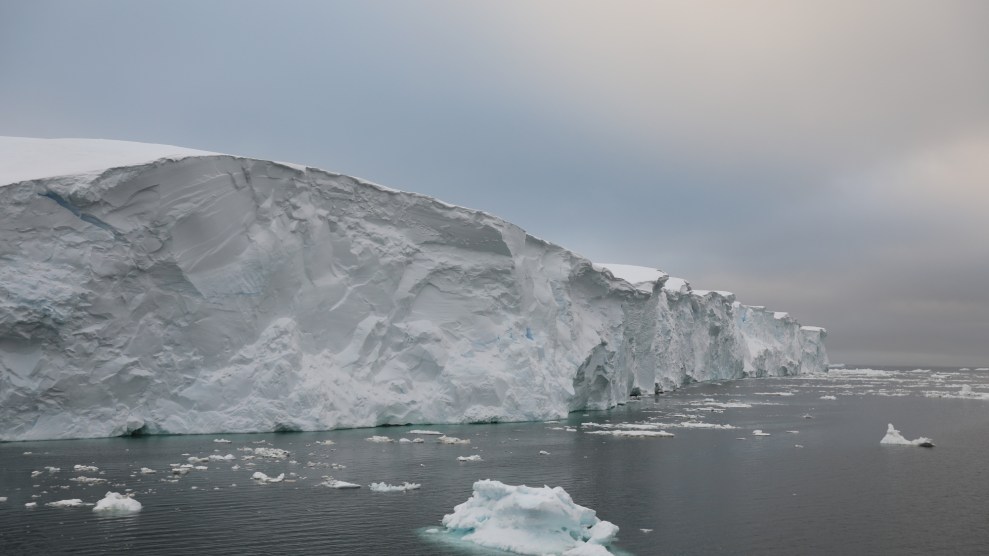The U.S. Supreme Court today considers whether Dick Cheney should be required to release documents from the energy task force
he headed in early 2001. The court’s decision, when it comes, will define nothing less the limits of executive privilege in formulating public policy.
Two groups, the Sierra Club and Judicial Watch, which have won lower
court rulings against Cheney, want the documents released in
order to determine what role energy industry lobbyists played in drawing up Bush administration energy policy. The fruit of the task force’s labors, of course, was a national energy prescription — the National Energy Policy — long on generous incentives for fossil fuel producers and notably short on conservation measures. Not coincidentally, environmental groups were excluded from the process. The obvious inference is that energy lobbyists essentially wrote their ticket, but we can’t be sure unless and until the documents are released.
The import of the case goes beyond energy policy, though. As USA Today notes, “the case that comes before the justices reflects increasing public concern over government secrecy and the stealthy influence of wealthy lobbyists.”
Cheney has defended the secrecy of the task force’s proceedings against all comers — including, of course, the General Accounting Office
— on the grounds that there exists a constitutionally protected “zone of autonomy” for presidential advice received in the ordinary course of proposing legislation. As Solicitor General Theodore B. Olson’s brief asserts, “Congress does not have the power to inhibit, confine or control the process through which the president formulates the legislative measures he proposes or the administrative actions he orders.”
He continues:
“Congress does not have the power to
inhibit, confine or control the process through which the
president formulates the legislative measures he proposes or
the administrative actions he orders.”
The case, says the Times‘ Linda Greenhouse, dovetails with the detainee-related cases also before the court this month.
“The Bush administration’s effort before the Supreme Court
to shield the names of private citizens who helped devise
its energy policy might appear on the surface unrelated to
its defense, in cases also before the court, of the
detention of those the administration has classified as
enemy combatants.
But the legal arguments are strikingly
similar, projecting a vision of presidential power in both
war and peace as far-reaching as any the court has seen and
posing important questions of the constitutional separation
of powers.
Just as the administration is arguing in the
detainee cases for the exercise of presidential authority
without judicial interference in policies related to the war
on terrorism, it is making sweeping claims in the energy
case for the existence of a constitutionally protected ‘zone
of autonomy’ for presidential advice received in the
ordinary course of proposing legislation.”
The Bush administration argues that Congress’s 1972 Federal
Advisory Committee Act, which mandates that task forces
must operate in an open manner, does not apply in this case because the energy task force meets the requirement for the law’s exemption — that all of its members were federal officials. On top of claiming the non-applicability of the law, the Bush administration contends, for good measure, that the law itself is unconstitutional. Judicial Watch and the Sierra Club argue that the industry representatives, for the purposes of the energy policy formulation, acted as “de facto members” of the task force.
That the energy lobby has benefited handsomely from the
work of the energy task force is indisputable. While
the president talked about hydrogen-fuel cells and other
research that would fundamentally transform our energy
policy, the task
force drafted a plan that reinforces the nation’s reliance on oil and natural
gas, with obvious consequences for the
environment and foreign policy. As
Foreign Policy in Focus points out:
“The
single most important step proposed … was
increasing domestic oil production by drilling in the Arctic
National Wildlife Refuge (A.N.W.R.), an immense, untouched
wilderness area in northeastern Alaska. While this proposal
has generated enormous controversy in the United States
because of its deleterious impact on the environment, it
also has allowed the White House to argue that the
administration is committed to a policy of energy
independence. However, careful examination of the Cheney
report leads to an entirely different conclusion. Aside from
the A.N.W.R. proposal, nothing in the N.E.P. would contribute to a
significant decline in U.S. dependence on imported
petroleum. In fact, the very opposite is true: The basic
goal of the Cheney plan is to find additional external
sources of oil for the United States.”
(Sidenote: The Boston Globe reported yesterday that Andrew Lundquist, the former executive director of the
energy task force, is currently lobbying Congress to pass the
very legislation that he has drafted — another example
of this administration’s cozy relationship with big oil and
gas.)
No one is questioning the right of the government to
consult with oil and other companies on matters of energy
policy (though environmental groups, which Cheney did
not deem it necessary to consult, should be involved as well).
But that’s beside the point. Cheney’s refusal
to hand over the documents only fuels speculation that the
energy lobby was not simply consulted, but was part of the
task force, and that the White House is using executive
privilege to cover up its wrongdoings.
Troublingly for the Supreme Court’s credibility, Chief
Justice Antonin Scalia, an old friend of Cheney’s — who
infamously went duck-hunting with him a few weeks after the
case was referred for the Court’s consideration — has
refused to recuse himself from the case. Scalia sees no conflict of interest and
said that:
“If it is reasonable to
think that a Supreme Court justice can be bought so cheap,
the nation is in deeper trouble than I had imagined.”
In any case, Scalia went on:
“Many justices have reached this court
precisely because they were friends of the incumbent
president or other senior officials.”
The question in front of Scalia and the other Justices is whether the public has the right to know if energy
lobbyists — also, big “friends of the incumbent president” — effectively sat on what was supposed to be an all-government task force.











